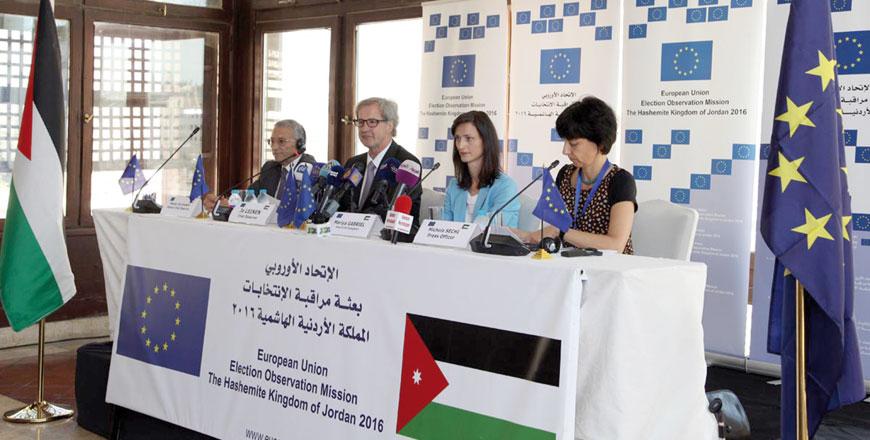You are here
EU observers label polls as ‘success’, suggest improvements
By Khetam Malkawi - Dec 05,2016 - Last updated at Dec 05,2016
AMMAN — In spite of minor issues, the September 20th parliamentary elections were a success and well administrated, EU observers said in their final report on the polls.
Chief observer of the European Union Election Observation Mission (EUEOM) to Jordan, Jo Leinen, submitted the report to the government on Sunday.
He presented the document to Prime Minister Hani Mulki, who said that the elections came as part of political reform that Jordan is implementing, pinpointing the “integrity and transparency” that characterised the process.
Senate President Faisal Fayez also received a copy of the EUEOM's report.
Fayez stressed that the reform process in Jordan is continuous in all political, economic, and social fields.
Speaking at a press conference to announce the findings, Leinen said: “We found some elements [in the electoral process] that can be improved. The report offers lots of recommendations and improvements” for Jordanian authorities.
The report classified recommendations into three categories, namely, priority, short-term and long-term recommendations.
The first group refers to issues which, if resolved, will bring elections significantly closer to meeting applicable international standards for democratic elections and will address important issues, such as further enhancing the confidence in the electoral process of citizens, political parties and candidates alike. In turn, this has the potential to enhance participation in elections, in particular by youth. However, the implementation of some priority recommendations would imply legislative amendments, the report said.
Priority recommendations also cover women and youth sectors, transparency and compliance with applicable international standards for democratic elections to guarantee broader participation and further enhance transparency in the elections.
A number of recommendations can be implemented without any legislative action.
However, the implementation of most priority recommendations addressing participation and compliance with international standards, such as protection of fundamental freedoms, universality and equality of the vote and the right to stand, would require legislative action by the newly elected Parliament and would benefit from broad consultation and public support, according to the mission’s statement
“The EUEOM hopes that these priority recommendations, as well as the additional ones, will be considered by the authorities and other election stakeholders,” Leinen stressed.
He added that although submitting the final report marks the end of the mission’s work in Jordan, the team is willing to extend further support, including training and consultations to Jordanian authorities.
“The EU stands ready to support Jordanian interlocutors in their efforts to bring elections further in line with Jordan’s international obligations and commitments,” he noted
Meanwhile, in its report, the mission said the September 20th, parliamentary elections were broadly viewed as a component of an ongoing political reform process, setting a noteworthy example in a region marred by violent conflict and extremism. This reform was supported by the EU and other key international stakeholders, authors noted.
In addition to the priority recommendations, the committee came up with a set of short-term suggestions that include the adoption and promotion of a comprehensive code of conduct between political actors in advance of elections to “contribute to a culture of adherence by political stakeholders to campaign regulations as well as promoting greater engagement with the electorate”.
The right of persons with disabilities to vote, including those confined within healthcare institutions, as well as other persons in places of detention (including jails or prisons) requires considering special measures, including the potential deployment of fixed or mobile voting stations in order to guarantee the possibility for such voters to effectively exercise their rights.
Improvement of current regulations for electoral media coverage is also recomemnded.
Long-term recommendations include having additional inputs in the legislation to develop party political activity in Jordan.
The EUEOM was deployed to Jordan from August 13 to November 6, 2016. The EUEOM fielded 108 observers from all 28 EU member states, plus Canada, Norway and Switzerland.
EUEOMs are independent from EU institutions or member states in their findings and conclusions, and abide by the laws of the host country and the Declaration of Principles for International Election Observation and the Code of Conduct.
Related Articles
AMMAN — Independent Election Commission (IEC) President Khaled Kalaldeh on Sunday received the EU Election Observation Mission’s final repor
AMMAN — The EU Election Observation Mission (EU EOM) to Jordan on Thursday said the parliamentary elections were well-organised and inclusiv
AMMAN — The 2016 parliamentary election was in overall "quite good", EU’s Election Observation Mission (EU EOM) to Jordan said.During a pres
















